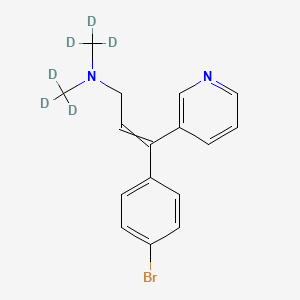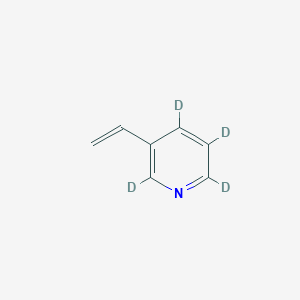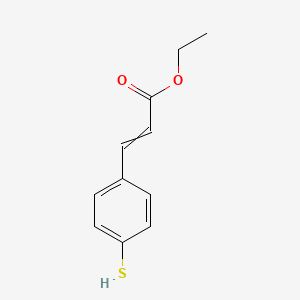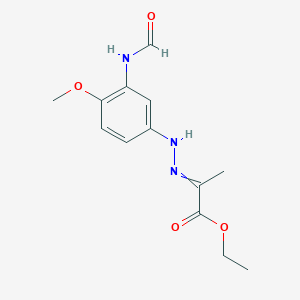
Acarbose
- Haga clic en CONSULTA RÁPIDA para recibir una cotización de nuestro equipo de expertos.
- Con productos de calidad a un precio COMPETITIVO, puede centrarse más en su investigación.
Descripción general
Descripción
Acarbose is a complex oligosaccharide that acts as an inhibitor of several enzymes responsible for the breakdown of complex carbohydrates in the intestines. It is primarily used as an anti-diabetic drug to manage type 2 diabetes mellitus by controlling postprandial blood glucose levels. This compound works by inhibiting alpha-glucosidase, an intestinal enzyme that releases glucose from larger carbohydrates such as starch and sucrose .
Métodos De Preparación
Synthetic Routes and Reaction Conditions: Acarbose is produced through a fermentation process involving the bacterium Actinoplanes sp. The biosynthesis involves the formation of acarviosin, which is then linked to maltose. The fermentation process is optimized by controlling the osmolality of the fermentation solution, which significantly affects the yield of this compound .
Industrial Production Methods: Industrial production of this compound involves large-scale fermentation using optimized conditions to maximize yield. The process includes the use of specific carbon sources, such as a mixture of maltose and glucose, to enhance the biosynthesis of this compound. The fermentation is carried out in bioreactors with controlled parameters such as temperature, pH, and oxygen supply .
Análisis De Reacciones Químicas
Types of Reactions: Acarbose undergoes various chemical reactions, including hydrolysis and enzymatic degradation. It is primarily involved in inhibition reactions where it binds to alpha-glucosidase enzymes, preventing the breakdown of complex carbohydrates .
Common Reagents and Conditions: The common reagents used in the reactions involving this compound include alpha-glucosidase enzymes and substrates such as maltose and sucrose. The reactions typically occur under physiological conditions in the gastrointestinal tract .
Major Products Formed: The major products formed from the reactions involving this compound are glucose and other simple sugars, which are released from the breakdown of complex carbohydrates .
Aplicaciones Científicas De Investigación
Acarbose has a wide range of scientific research applications, including:
Chemistry: this compound is used as a model compound to study enzyme inhibition and carbohydrate metabolism.
Biology: It is used to investigate the role of alpha-glucosidase in various biological processes and to study the effects of enzyme inhibition on cellular functions.
Medicine: this compound is widely used in the treatment of type 2 diabetes mellitus to control postprandial blood glucose levels. .
Industry: this compound is used in the pharmaceutical industry for the production of anti-diabetic medications. .
Mecanismo De Acción
Acarbose exerts its effects by inhibiting alpha-glucosidase enzymes located in the brush-border of the intestinal mucosa. These enzymes are responsible for metabolizing oligo-, tri-, and disaccharides into absorbable simple sugars. By inhibiting these enzymes, this compound limits the absorption of dietary carbohydrates and reduces the postprandial increase in blood glucose and insulin levels . The inhibition is competitive and reversible, and this compound mimics the transition state of the substrate with its amine linkage .
Comparación Con Compuestos Similares
Voglibose: Another alpha-glucosidase inhibitor used to manage postprandial blood glucose levels in diabetic patients.
Miglitol: An alpha-glucosidase inhibitor that is structurally different from acarbose and voglibose.
Uniqueness of this compound: this compound is unique due to its complex oligosaccharide structure and its ability to inhibit multiple enzymes involved in carbohydrate metabolism. It has been shown to be effective in reducing postprandial blood glucose levels and improving cardiovascular outcomes in diabetic patients .
Propiedades
Número CAS |
56810-94-0 |
|---|---|
Fórmula molecular |
C25H43NO18 |
Peso molecular |
645.6 |
Origen del producto |
United States |
Descargo de responsabilidad e información sobre productos de investigación in vitro
Tenga en cuenta que todos los artículos e información de productos presentados en BenchChem están destinados únicamente con fines informativos. Los productos disponibles para la compra en BenchChem están diseñados específicamente para estudios in vitro, que se realizan fuera de organismos vivos. Los estudios in vitro, derivados del término latino "in vidrio", involucran experimentos realizados en entornos de laboratorio controlados utilizando células o tejidos. Es importante tener en cuenta que estos productos no se clasifican como medicamentos y no han recibido la aprobación de la FDA para la prevención, tratamiento o cura de ninguna condición médica, dolencia o enfermedad. Debemos enfatizar que cualquier forma de introducción corporal de estos productos en humanos o animales está estrictamente prohibida por ley. Es esencial adherirse a estas pautas para garantizar el cumplimiento de los estándares legales y éticos en la investigación y experimentación.






![4-[1-(4-Iodophenyl)-5-(2,4-dinitrophenyl)-formaz-3-yl]-1,3-benzene Disulfonate, Disodium Salt](/img/structure/B1140545.png)


![(7S,11S,12S,13S,14R,15R,16R,17S,18S)-1'-tert-butyl-2,13,15,17,32-pentahydroxy-11-methoxy-3,7,12,14,16,18,22-heptamethylspiro[8,33-dioxa-24,27,29-triazapentacyclo[23.6.1.14,7.05,31.026,30]tritriaconta-1(32),2,4,9,19,21,24,26,30-nonaene-28,4'-piperidine]-6,23-dione](/img/structure/B1140550.png)

pyrimidine-2,4-dione](/img/structure/B1140558.png)

